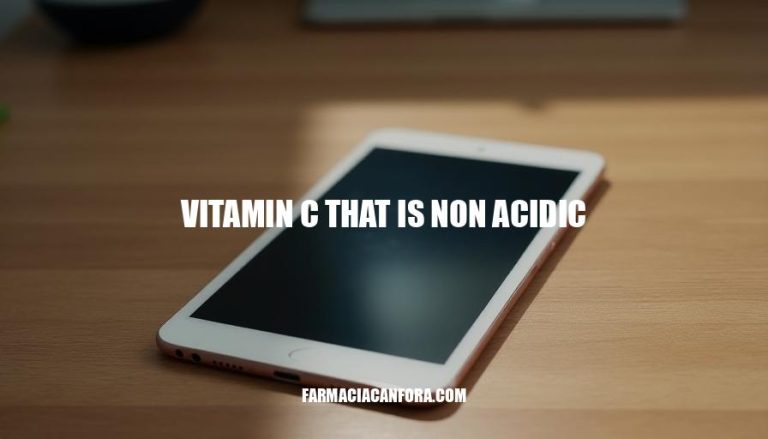


Vitamin C that’s not acidic is a gentler option for people who get digestive issues or have health conditions that need a less irritating way to get this important nutrient. Unlike regular ascorbic acid, which can sometimes cause stomach problems because it’s acidic, non-acidic vitamin C comes in forms like sodium ascorbate or calcium ascorbate. These forms make the acidity go away, making them better for people with sensitive stomachs or conditions like acid reflux.
Its special mix makes sure it gets absorbed well without hurting your digestive system.
Non-acidic vitamin C gives you the same powerful benefits as regular vitamin C, helping your immune system, making collagen, and protecting against damage from free radicals. It also helps keep your skin healthy, heals wounds faster, and helps your body use iron better. Choosing a non-acidic form lets people take their daily vitamin C without getting stomach problems, so they can stay healthy and feel good.
Non-acidic vitamin C, often found in buffered or mineral ascorbate forms such as sodium ascorbate or calcium ascorbate, provides a range of benefits while being notably gentle on the stomach. Unlike standard ascorbic acid, which can sometimes cause gastrointestinal discomfort, non-acidic varieties maintain a neutral pH, reducing the likelihood of irritation. This makes them especially suitable for individuals with sensitive digestion, acid reflux, or conditions that make acidic compounds problematic.
Immune function receives significant support from non-acidic vitamin C, just as with traditional forms.
It contributes to enhanced white blood cell activity, supports antibody production, and aids the body in combatting oxidative stress caused by infections. Since this form is well-tolerated, individuals prone to digestive distress can consistently maintain adequate vitamin C levels without experiencing discomfort.
Skin health benefits considerably from non-acidic vitamin C. It plays a crucial role in collagen synthesis, helping to maintain firmness, elasticity, and wound healing.
By participating in antioxidant defense mechanisms, it mitigates environmental damage caused by pollutants and UV radiation, preventing premature aging. The gentle nature of non-acidic vitamin C ensures consistent supplementation without triggering acidity-related flare-ups that could exacerbate inflammatory skin conditions.
General well-being improves through regular consumption of non-acidic vitamin C. It assists iron absorption, ensuring better oxygen transport throughout the body.
Additionally, its antioxidant properties contribute to cellular health by neutralizing free radicals, reducing oxidative damage that accelerates aging and chronic disease progression. Furthermore, individuals sensitive to gastric irritation can take higher doses without experiencing discomfort, making long-term supplementation feasible.
This form of vitamin C stands out as an optimal choice for those requiring digestive ease while still gaining comprehensive immune, skin, and wellness benefits.
Non-acidic vitamin C, found in forms like sodium ascorbate or calcium ascorbate, is a gentler option for individuals who experience digestive issues or have health conditions that require a less irritating way to obtain this essential nutrient. Unlike regular ascorbic acid, which can cause stomach problems due to its acidity, non-acidic vitamin C maintains a neutral pH, reducing the likelihood of irritation and making it suitable for those with sensitive digestion, acid reflux, or other conditions.
The gentle nature of non-acidic vitamin C makes it an optimal choice for individuals who require digestive ease while still gaining comprehensive immune, skin, and wellness benefits. It allows for consistent supplementation without triggering acidity-related flare-ups, making long-term use feasible even for those with sensitive stomachs or conditions like acid reflux.